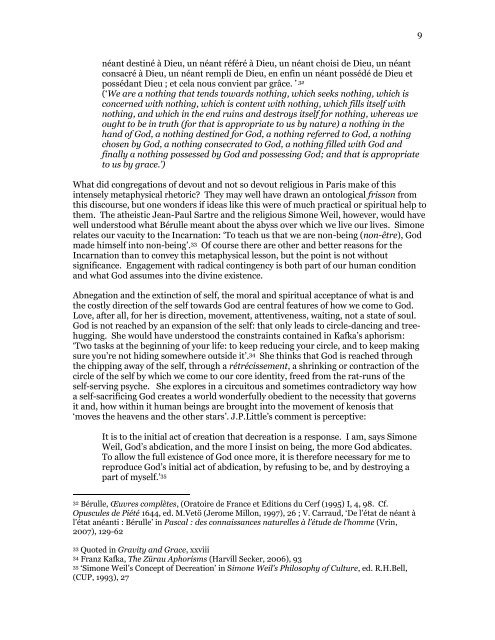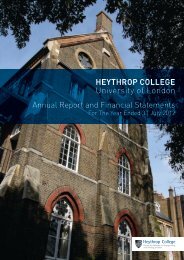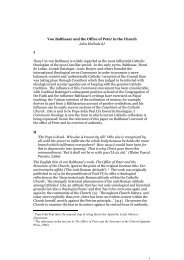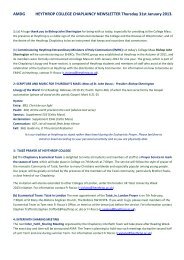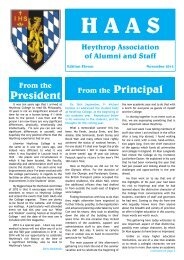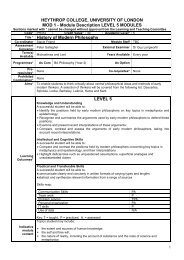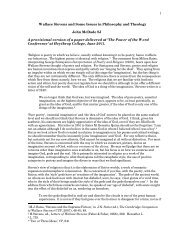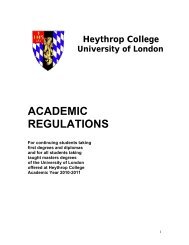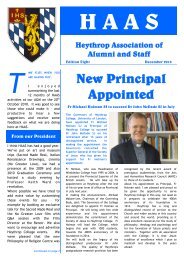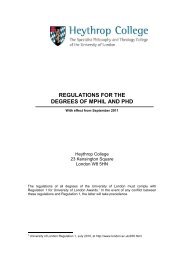Simone Weil: Affliction and Necessity
Simone Weil: Affliction and Necessity
Simone Weil: Affliction and Necessity
You also want an ePaper? Increase the reach of your titles
YUMPU automatically turns print PDFs into web optimized ePapers that Google loves.
9néant destiné à Dieu, un néant référé à Dieu, un néant choisi de Dieu, un néantconsacré à Dieu, un néant rempli de Dieu, en enfin un néant possédé de Dieu etpossédant Dieu ; et cela nous convient par grâce. ‟ 32(„We are a nothing that tends towards nothing, which seeks nothing, which isconcerned with nothing, which is content with nothing, which fills itself withnothing, <strong>and</strong> which in the end ruins <strong>and</strong> destroys itself for nothing, whereas weought to be in truth (for that is appropriate to us by nature) a nothing in theh<strong>and</strong> of God, a nothing destined for God, a nothing referred to God, a nothingchosen by God, a nothing consecrated to God, a nothing filled with God <strong>and</strong>finally a nothing possessed by God <strong>and</strong> possessing God; <strong>and</strong> that is appropriateto us by grace.’)What did congregations of devout <strong>and</strong> not so devout religious in Paris make of thisintensely metaphysical rhetoric? They may well have drawn an ontological frisson fromthis discourse, but one wonders if ideas like this were of much practical or spiritual help tothem. The atheistic Jean-Paul Sartre <strong>and</strong> the religious <strong>Simone</strong> <strong>Weil</strong>, however, would havewell understood what Bérulle meant about the abyss over which we live our lives. <strong>Simone</strong>relates our vacuity to the Incarnation: „To teach us that we are non-being (non-être), Godmade himself into non-being‟. 33 Of course there are other <strong>and</strong> better reasons for theIncarnation than to convey this metaphysical lesson, but the point is not withoutsignificance. Engagement with radical contingency is both part of our human condition<strong>and</strong> what God assumes into the divine existence.Abnegation <strong>and</strong> the extinction of self, the moral <strong>and</strong> spiritual acceptance of what is <strong>and</strong>the costly direction of the self towards God are central features of how we come to God.Love, after all, for her is direction, movement, attentiveness, waiting, not a state of soul.God is not reached by an expansion of the self: that only leads to circle-dancing <strong>and</strong> treehugging.She would have understood the constraints contained in Kafka‟s aphorism:„Two tasks at the beginning of your life: to keep reducing your circle, <strong>and</strong> to keep makingsure you‟re not hiding somewhere outside it‟. 34 She thinks that God is reached throughthe chipping away of the self, through a rétrécissement, a shrinking or contraction of thecircle of the self by which we come to our core identity, freed from the rat-runs of theself-serving psyche. She explores in a circuitous <strong>and</strong> sometimes contradictory way howa self-sacrificing God creates a world wonderfully obedient to the necessity that governsit <strong>and</strong>, how within it human beings are brought into the movement of kenosis that„moves the heavens <strong>and</strong> the other stars‟. J.P.Little‟s comment is perceptive:It is to the initial act of creation that decreation is a response. I am, says <strong>Simone</strong><strong>Weil</strong>, God‟s abdication, <strong>and</strong> the more I insist on being, the more God abdicates.To allow the full existence of God once more, it is therefore necessary for me toreproduce God‟s initial act of abdication, by refusing to be, <strong>and</strong> by destroying apart of myself.‟ 3532 Bérulle, Œuvres complètes, (Oratoire de France et Editions du Cerf (1995) I, 4, 98. Cf.Opuscules de Piété 1644, ed. M.Vetö (Jerome Millon, 1997), 26 ; V. Carraud, „De l‟état de néant àl‟état anéanti : Bérulle‟ in Pascal : des connaissances naturelles à l’étude de l’homme (Vrin,2007), 129-6233 Quoted in Gravity <strong>and</strong> Grace, xxviii34 Franz Kafka, The Zürau Aphorisms (Harvill Secker, 2006), 9335 „<strong>Simone</strong> <strong>Weil</strong>‟s Concept of Decreation‟ in <strong>Simone</strong> <strong>Weil</strong>’s Philosophy of Culture, ed. R.H.Bell,(CUP, 1993), 27


